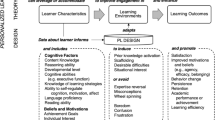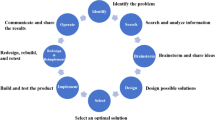Abstract
This paper reports on research investigating six middle school teachers without engineering degrees as they taught an engineering unit on the engineering design process. Videotaped classroom sessions and teacher interviews were analyzed to understand the subject matter and pedagogical content knowledge the teachers used and developed as they introduced the eight steps of the engineering design process (from content standards for the state of Massachusetts, USA). The teachers demonstrated wide-ranging knowledge of the engineering design process, and this paper describes two of the steps the teachers showed a more sophisticated understanding—constructing a prototype and redesigning. Examples from the teachers illustrate strengths that can be built upon as well as some areas for further development.


Similar content being viewed by others
References
Ball, D. L. (1990). The mathematical understandings that prospective teachers bring to teacher education. The Elementary School Journal, 90(4), 449–466.
Ball, D. L. (2000). Bridging practices: Intertwining content and pedagogy in teaching and learning to teach. Journal of Teacher Education, 51(3), 241–247.
Ball, D. L., & Bass, H. (2003). Toward a practice-based theory of mathematical knowledge for teaching. In B. Davis & E. Simmt (Eds.), Proceedings of the 2002 annual meeting of the Canadian mathematics education study group (pp. 3–14). Edmonton, AB: CMESG/GCEDM.
Berliner, D. C. (1994). Expertise the wonder of exemplary performances. In J. N. Mangieri & C. C. Block (Eds.), Creating powerful thinking in teachers and students. Fort Worth, TX: Rinehart & Winston.
Borko, H., & Livingston, C. (1989). Cognition and Improvisation: Differences in mathematics instruction by expert and novice teachers. American Educational Research Journal, 26(4), 473–498.
Borko, H., Peressini, D., Romagnano, L., Knuth, E., Willis-Yorker, C., Wooley, C., et al. (2000). Teacher education does matter: A situated view of learning to teach secondary mathematics. Educational Psychologist, 35(3), 193–206.
Chi, M., Glaser, R., & Rees, E. (1982). Expertise in problem solving. In R. Sternberg (Ed.), Advances in the psychology of human intelligence (Vol. 1, pp. 1–75). Hillsdale, NJ: Lawrence Erlbaum Associates.
Cross, N., & Roozenburg, N. (1993). Modelling the design process in engineering and in architecture. Journal of Engineering Design, 3(4), 325–337.
Cross, N. (2000). Engineering design methods: Strategies for product design (3rd ed.). Chichester, England: Wiley.
Darling-Hammond, L., Berry, B., & Thoreson, A. (2001). Does teacher certification matter? Evaluating the evidence. Educational Evaluation and Policy Analysis, 23(1), 57–77.
Davis, E. A. (2003). Knowledge integration in science teaching: analyzing teachers' knowledge development. Research in Science Education, 34, 21–53.
Driel, J. H., Verloop, N., & Vos, W. d. (1998). Developing science teacher’s pedagogical content knowledge. Journal of Research in Science Teaching, 35(6), 673–695.
Dym, C. L., & Little, P. (2004). Engineering Design: A Project-Based Introduction. New York: Wiley.
Gess-Newsome, J. (1999). Pedagogical content knowledge: An introduction and orientation. In J. Gess-Newsome (Ed.), Examining pedagogical content knowledge: The construct and its implications for science education. Dordrecht: Kluwer Academic.
International Technology Education Association. (2002). Standards for technological literacy: Content for the study of technology (2nd ed.). Reston: International Technology Education Association.
Lampert, M. (1986). Knowing, doing, and teaching multiplication. Cognition and Instruction, 3(4), 305–342.
Lampert, M. (1990). When the problem is not the question and the solution is not the answer: Mathematical knowing and teaching. American Educational Research Journal, 27, 29–63.
Lawson, B. (1997). How designers think: The design process demystified (3rd ed.). Boston: Architectural Press.
Ma, L. (1999). Knowing and teaching elementary mathematics. Mahwah, NJ: Lawrence Erlbaum Associates.
Magnusson, S., Krajcik, J., & Borko, H. (1999). Nature, sources, and development of pedagogical content knowledge for science teaching. In J. Gess-Newsome & N. G. Lederman (Eds.), Examining pedagogical content knowledge: The construct an its implications for science education (Vol. 6, pp. 95–132). Dordrecht, The Netherlands: Kluwer Academic Publishers.
Massachusetts DOE. (2006). Massachusetts science and technology/engineering curriculum framework. Massachusetts.
McAdoo, M. (1998). Companies steer new K-12 courses. IEEE Spectrum, 35, 27–33.
McCormick, R. (2004). Issues of learning and knowledge in technology education. International Journal of Technology and Design Education, 14, 21–44.
McKenna, A., & Agogino, A. (1998). A web-based instructional module for teaching middle school students engineering design with simple machines. Journal of Engineering Education, 87(4), 437–444.
National Research Council (Ed.). (2005). National science education standards. Washington DC: National Academy Press.
Newfoundland and Labrador Department of Education. (2007). Foundation for the Atlantic Canada Technology Education Curriculum. From http://www.ed.gov.nl.ca/edu/sp/foundations/tech_edu/te_found_nf-lab_full.pdf. Retrieved 29 Nov 2007.
Peterson, P. L. (1988). Teachers' and students' cognitional knowledge for classroom teaching and learning. Educational Researcher, 17(5), 5–14.
Rowan, B., Correnti, R., & Miller, R. (2002). What large-scale, survey research tells us about teacher effects on student achievement: Insights from the prospects study of elementary schools. Teachers College Record, 104(8), 1525–1567.
Sherin, M. G., & Han, S. Y. (2004). Teacher learning in the context of a video club. Teaching and Teacher Education, 20(2), 163–183.
Shulman, L. S. (1986). Those who can understand: Knowledge growth in teaching. Educational Researcher, 15(2), 4–14.
Shulman, L. S. (1987). Knowledge and teaching: foundations of the new reform. Harvard Educational Review, 57(1), 1–22.
Veal, W. R., Tippins, D. J., & Bell, J. (1998, April). The Evolution of Pedagogical Content Knowledge in Prospective Secondary Physics Teachers. Paper presented at the annual meeting of the National Association for Research in Science Teaching, San Diego, CA.
Author information
Authors and Affiliations
Corresponding author
Appendix
Appendix
Pre-Interview
Educational background
-
Please describe your educational background including your undergraduate and graduate studies.
-
Please describe the science courses you took in college. How did you do in these courses?
-
Please describe the math courses you took in college. How did you do in these courses?
-
Please describe any engineering courses you took in college OR any courses that may have involved engineering-like projects or experiences. How did you do in these courses or experiences?
Experiences
-
Please describe any experiences related to math, science, or engineering you have had in your life. This may include construction projects, summer jobs, previous professions, etc.
-
Are you tech savvy? For example, do you use computers often, do you set up your own household electronics, do you understand mechanical gadgets and how they work?
Mid-Interview
Review the topics/concepts covered in the previous lessons
-
What did you feel were the most important concepts for the students to come away understanding from lesson x?
-
If you were not using LEGO for the spatula design challenge, what material(s) would you choose to use instead, and why?
-
What made the strongest design so strong?
-
Do you believe the students understand what makes for a strong spatula? If you were going to teach this lesson again, what would you do the same and what would you do different?
-
Was there anything that surprised you while teaching these concepts?
-
Did you develop any strategies or methods for teaching these concepts that you didn’t have before? Did you develop new PCK? Did you develop new SMK?
Review a teaching incidence or situation with the teacher
-
How did you know to say that? Describe the subject matter knowledge you called upon in this situation.
-
Why did you say x, y, and z? Would you have said something different to another student?
-
Why did you choose that real-world example?
-
What was the outcome of this situation? Were you satisfied with the outcome? What do you believe the student learned in this situation? What did you learn from this interaction? What knowledge do you think may have helped you create a more successful outcome?
-
Did you take any new pedagogical content knowledge away from this interaction?
Final interview
Review the important topics/concepts covered in the curriculum and subject matter knowledge development
-
What topics do you believe you taught well? Why? Did you already know the concepts before the training?
-
What topics did you not teach as well? Why?
-
What were some of the challenges in teaching these concepts to your students?
-
What SMK did you learn or reinforce for yourself?
Pedagogical content knowledge used and developed
-
What did you learn about your students regarding their understanding of engineering, math or science (emphasis on engineering and engineering design process)?
-
What strategies did you use to teach this unit? Were there strategies that were different from your math or science classroom teaching?
-
What were some of the challenges of teaching this curriculum?
-
What did the students struggle with in this curriculum? What specific concepts or ideas did the students struggle with?
Rights and permissions
About this article
Cite this article
Hynes, M.M. Middle-school teachers’ understanding and teaching of the engineering design process: a look at subject matter and pedagogical content knowledge. Int J Technol Des Educ 22, 345–360 (2012). https://doi.org/10.1007/s10798-010-9142-4
Published:
Issue Date:
DOI: https://doi.org/10.1007/s10798-010-9142-4




